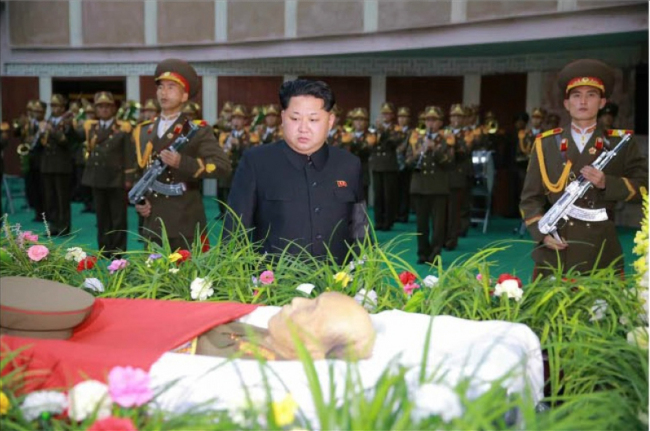North Korean state media said Monday that leader Kim Jong-un had on Sunday conveyed his condolences for a deceased military marshal whose funeral committee set off speculation over the political health of ranking officials.
Ri Ul-sol, also a close assistant to the sitting ruler’s late grandfather Kim Il-sung, died from lung cancer Saturday at age 94. The young Kim, who presides over his 170-member funeral committee, visited the Central Hall of Workers in Pyongyang housing Ri’s body, met with his family and sent flowers.
During the trip, Kim expressed his “deep condolences,” looking around the mortuary with “heartrending feelings about the loss of a loyal, old revolutionary who devoted his all to nurturing soldiers into real revolutionaries to his last moment,” the North’s official Korean Central News Agency said.
“(Ri) was the most faithful revolutionary fighter and comrade to (Kim Il-sung) and his death is a great loss for our party, military and people,” it quoted Kim Jong-un as saying.
 |
North Korean leader Kim Jong-un (center) pays tribute to Ri Ul-sol, a retired military marshal who died Saturday at the age of 94 from lung cancer, at the Central Hall of Workers in Pyongyang on Sunday where his body is laid. (Yonhap) |
Born in 1921 into a poor peasant family in Chongjin, North Hamgyong Province, Ri joined Kim Il-sung, who led a guerilla squad that fought against Japanese colonial rulers in the 1930s.
A “state funeral” is scheduled for Wednesday after receiving mourners for three days from Sunday.
Yet the omission of some senior officials from the list of the funeral committee members unveiled Sunday continues to fan questions about their statuses. The most conspicuously absent figure is Choe Ryong-hae, a secretary of the ruling Workers’ Party and former director of the General Political Bureau of the Korean People’s Army who was once deemed the country’s No. 2 man.
Choe also did not accompany Kim during a visit to Ri’s body, unlike other high-flying executives listed in the committee, such as Hwang Pyong-so, vice chairman of the NDC and current military politburo director, Defense Minister Pak Yong-sik and Ri Yong-gil, chief of the military general staff.
Seoul’s Unification Ministry spokesman Jeong Joon-hee said at a news briefing Monday his agency is looking into the matter and “taking all possibilities into account.”
The roster also raised the possibility of a replacement of other officials, such as Han Kwang-bok, director of the party central committee’s science and education department, to Choe Sang-gon; and O Il-jong, director of the committee’s military department, to Ri Yong-rae.
Ri Jae-il, first vice director of the party’s propaganda and agitation department; An Jong-su, director of the light industry department; and Han Kwang-sang, director of the finance and accounting department, appeared to have also been dismissed, but their successors have yet to emerge, said Chong Seong-chang, head of unification strategy research at the Sejong Institute.
“Since the lists of funeral committees announced by North Korea contain much valuable information on personnel changes, Seoul should conduct an in-depth analysis and reflect it on its own North Korea portal site,” he said.
By Shin Hyon-hee (
heeshin@heraldcorp.com)








